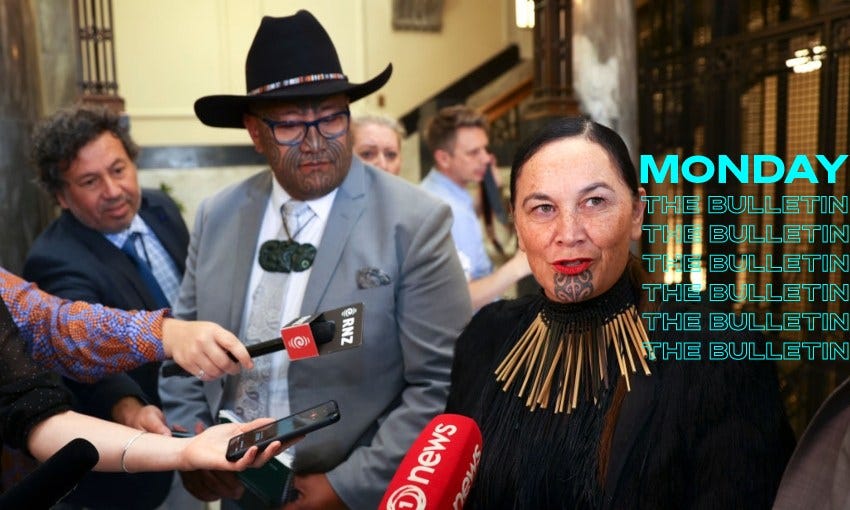Who could Te Pāti Māori work with?
Based on recent polling, Te Pāti Māori would hold the balance of power at the next election. They're seeking something new from any possible arrangement with the next government.
Mōrena and welcome to The Bulletin for Monday, May 9, by Anna Rawhiti-Connell. Presented in partnership with Z Energy.
In today’s edition: $562m for police and crime; Luxon on diversity; hospice services may be reduced; but first, Te Pāti Māori on holding the balance of power.
Te Pāti Māori co-leaders Debbie Ngarewa-Packer and Rawiri Waititi (Getty Images)
A Tiriti-centric Aotearoa
Three recent polls have shown Te Pāti Māori to be in the position of deciding what the next government would look like. Jack Tame spoke to Te Pāti Māori co-leaders Rawiri Waititi and Debbie Ngarewa-Packer on Sunday about democracy, co-governance, who they could work with and what they are in parliament to achieve. Waititi said that at the moment, being in opposition is the best way to support their kaupapa, as they’re able to advocate fiercely. Neither seemed particularly ambitious about taking a role like deputy prime minister, saying a decision like that would be driven by whether it was a fit with their kaupapa. Waititi said a "Tiriti-centric Aotearoa" would be the basis of any negotiations.
“Extreme difficulty” working with parties that oppose Māori Health Authority
When asked about who they could and couldn’t work with in a potential government, Ngarewa-Packer sees “extreme difficulty” working with parties that oppose the new Māori Health Authority. Christopher Luxon said the National party would scrap the Māori Health Authority on Wednesday but that he has a good relationship with Waititi. When asked by Stuff’s Henry Cooke whether the National party could work with Te Pāti Māori, Luxon said he didn’t want to discuss any “electoral calculations”. Writing for RNZ, Peter Wilson said Te Pāti Māori holding the balance of power would “almost certainly favour Labour”.
Act would not support Te Pāti Māori’s position on Te Tiriti in coalition talks
After the most recent poll on Tuesday night, which had Act down 1.6% on the last Newshub-Reid Research poll, Act sent a fundraising email asking for donations to “keep the Māori Party out of government”. In an interview on RNZ’s Midday Report, Māni Dunlop pressed Act party leader David Seymour for a “yes” or “no” answer on whether he would take up Waititi’s offer of a mature and honest discussion about honouring Te Tiriti. Seymour said he would not support the Māori Party's position on Te Tiriti o Waitangi in any coalition talks. Dunlop took that as a “no”.
Not coalition or confidence and supply but something new
Waititi said any arrangements with parties in forming a new government wouldn’t be a coalition or confidence and supply arrangement, but rather something new. It would be a “tiriti-centric kaupapa” that would be “fair, just, equal and equitable for all, not just tangata whenua”. There are 18 months until the next election and, as Ngarewa-Packer said in this NZ Herald piece (paywalled) from Michael Neilson about polling in late March, “One blooming pōhutukawa does not make for a great summer”.
A message from our creative director, Toby Morris: Here at The Spinoff we’re proud to be a bit different. In the way we approach our journalism, in our tone, in the things we’re thinking about, all the way through to our design and our videos and our podcasts, we’d like to think we’re doing things and trying things in a way that no other New Zealand media organisations would. And it’s our beloved members that let us do that - both through their financial support, and the encouragement of their engagement: they’re readers who care like we care, who are also interested in seeing things done in a slightly different way. If you like what we’re doing and want to see more of it, have a think about joining up, and help The Spinoff be The Spinoff. Join today!
$562m funding package for police and corrections
Minister’s Kris Faafoi, Kelvin Davis and Poto Williams made the pre-budget announcement yesterday morning at the Counties Manukau police station. The package includes funding for more police, $94 million to tackle gangs and organised crime, support for businesses to protect against ram raids and funding for a nationwide rollout of the tactical response model for frontline police and rehabilitation programmes. There was also a $204m allocation towards establishing a new firearms unit. This was a recommendation from the Royal Commission of Inquiry into the Christchurch mosque shootings. The inquiry report noted that in 2017/2018 the firearm licensing system cost $14m to run. $3.63m was received in licensing fees, leaving police to draw $10.40m from their budget to cover the deficit.
Luxon admits there is more work to do in attracting diverse candidates
The National party leader was in Ashburton on Friday. He received questions at a public meeting about the increasing use of te reo names for government departments and places but moved quickly past them, saying New Zealanders were concerned about bigger things like the cost of living. Luxon also attended by-election candidate Sam Uffindell’s campaign launch in Tauranga on Saturday, promising a more diverse line-up of candidates for the 2023 election and admitted the party had “more work to do”.
Hospices may need to reduce services or shut down altogether
Government funds cover half the cost of running hospices in New Zealand, while hospices raise the rest through op shops and charity events. Te Kahu Pairuri/Hospice NZ acting CEO Wayne Naylor said costs have grown by more than $41m since 2017, while Government funding has increased by just $18.8m. “It’s not going to be sustainable; we can’t keep asking the community for more and more money to fill a significant funding gap,” said Naylor. In February, Tōtara Hospice CEO Tina McCafferty told Q&A that services at the south Auckland hospice had been reduced amid a looming shortfall of about $1.3 million.
Every year $1bn of food goes to waste in Aotearoa. That’s why Supie is pioneering a new way to get food directly from the people who produce it straight into your kitchen. Supie’s ordering model is designed to reduce food waste and ensure you only receive the freshest produce, by working closely with their producers and partners to order only when needed. Supie are building a more sustainable way to buy and sell food in New Zealand. Every product on Supie has been hand-selected to align with their mission to provide better quality food, at better prices, that’s better for the world. Try Supie today and get $70 worth of free groceries and a vision into their vision for a fairer, fresher online supermarket. (Sponsored)
Got some feedback about The Bulletin, or anything in the news? Get in touch with me at thebulletin@thespinoff.co.nz
Chris Schulz asks what can be done to help Auckland’s CBD feel less apocalyptic; Graeme Edgeler sets out the case for parliament’s Speaker to be elected by secret ballot; Jazial Crossley writes about the joys of becoming a “parent-ish” figure to your partner’s child; and Alex Casey finds out how TV show Down For Love is transforming reality romance.
Team NZ gets out of the water
Stuff’s Duncan Johnstone takes a look at Team NZ’s land yacht which is near completion and headed for testing at Whenuapai. The team is seeking to break the current wind-powered land speed record. The current record is held by Richard Jenkins who broke the record in 2009 in a land yacht he called the Ecotricity Greenbird. Team NZ would need to get their land yacht racing faster than Jenkin’s speed of 202.9kmh. Team CEO Grant Dalton said it was a “new challenge, and brings some fun factor to the organisation”. The team also expects there’ll be benefits that would be useful for their next yachting campaign.















